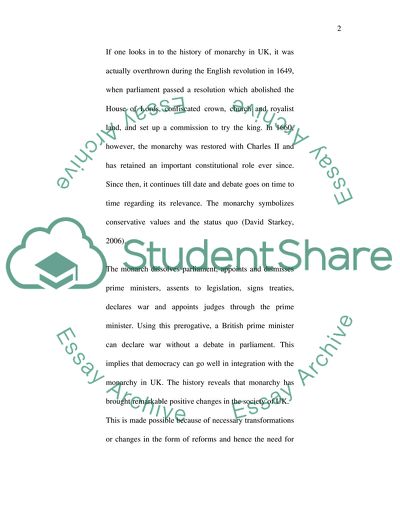Cite this document
(The Role of the Monarchy in the UK Assignment Example | Topics and Well Written Essays - 2750 words, n.d.)
The Role of the Monarchy in the UK Assignment Example | Topics and Well Written Essays - 2750 words. https://studentshare.org/politics/1710023-what-is-the-role-of-the-monarchy-in-the-uk-and-how-has-it-adjusted-to-secure-its-position-how-convincing-are-the-arguments-for-its-replacement-by-an-elected-he
The Role of the Monarchy in the UK Assignment Example | Topics and Well Written Essays - 2750 words. https://studentshare.org/politics/1710023-what-is-the-role-of-the-monarchy-in-the-uk-and-how-has-it-adjusted-to-secure-its-position-how-convincing-are-the-arguments-for-its-replacement-by-an-elected-he
(The Role of the Monarchy in the UK Assignment Example | Topics and Well Written Essays - 2750 Words)
The Role of the Monarchy in the UK Assignment Example | Topics and Well Written Essays - 2750 Words. https://studentshare.org/politics/1710023-what-is-the-role-of-the-monarchy-in-the-uk-and-how-has-it-adjusted-to-secure-its-position-how-convincing-are-the-arguments-for-its-replacement-by-an-elected-he.
The Role of the Monarchy in the UK Assignment Example | Topics and Well Written Essays - 2750 Words. https://studentshare.org/politics/1710023-what-is-the-role-of-the-monarchy-in-the-uk-and-how-has-it-adjusted-to-secure-its-position-how-convincing-are-the-arguments-for-its-replacement-by-an-elected-he.
“The Role of the Monarchy in the UK Assignment Example | Topics and Well Written Essays - 2750 Words”. https://studentshare.org/politics/1710023-what-is-the-role-of-the-monarchy-in-the-uk-and-how-has-it-adjusted-to-secure-its-position-how-convincing-are-the-arguments-for-its-replacement-by-an-elected-he.


